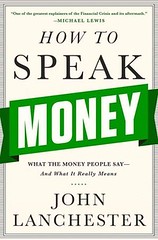
PREV ARTICLE
NEXT ARTICLE
FULL ISSUE
PREV FULL ISSUE
JOHN LANCHESTER ON THE ORIGIN OF THE DOLLARJeff Reichenberger writes: This past weekend I heard an interview on NPR with author John Lanchester, who has written a book entitled; "How to Speak Money: What the Money People say and what it really means." Hardcover, 256 pages, W W Norton & Co Inc, List Price: $26.95 In the interview they discussed the origin of the word 'dollar' which has probably already been covered in The E-Sylum, but I thought it was interesting and have excerpt a bit of the discussion here. Here's the excerpt. On the web page linked below you can listen to the
interview. -Editor
LANCHESTER: I don't know how to pronounce it either. I'm going to take a wild guess. (Reading) Jachymov. I bet you've indirectly referred to this place in the Czech Republic at some point in the last week. If you're interested in money, you will certainly have used it at some point in the last day, maybe even in the last hour. How so? Can you guess? Give up? Well, the Bohemian town of Jachymov is known in German as Joachimsthal. Does that help? It was the site of a famous silver mine, a town that grew tenfold in population between 1516 to 1526 as it became the center of a boom based on the manufacture of a silver coin known as joachimsthaler. It in time became known tolar or thaler. The coins were a standard size and form of currency throughout most of Europe for 400 years. And it's from this ubiquity that we get the word dollar. So every time a dollar is mentioned, someone is unknowingly citing this otherwise obscure spot in rural Bohemia. INTERVIEWER: So there's a term that I think might not help me read the Financial Times. But you clearly take great delight in unearthing this connection. LANCHESTER: There's this - one of the threads in the book has to do with the oddness of money. You know, a thing that makes people go slightly nuts is when they start thinking about where does money come from? Where does its value come from? Why is it worth what it's worth? Especially when it's digital ones and zeros, dots on the screen that seem so fragile, they seem fictional. We seem to have willed their meaning to being. And yet, the meanings are so consequential it shapes the texture of everyday life. So I'm very interested in that thing with the materiality of money. When you can trace money back to actual stuff, it's dug out of a hole in the ground, somebody stamps an image on it, people agree what that coin with the image is worth, and then you trade with it. And I like tracing money from those very first roots all the way through to this astonishing virtual - things like, you know, Bitcoin and things like that that also feature in the book. To read the complete article, see:
THE BOOK BAZARREWayne Homren, Editor The Numismatic Bibliomania Society is a non-profit organization promoting numismatic literature. See our web site at coinbooks.org. To submit items for publication in The E-Sylum, write to the Editor at this address: whomren@gmail.com To subscribe go to: https://my.binhost.com/lists/listinfo/esylum All Rights Reserved. NBS Home Page Contact the NBS webmaster 
|
